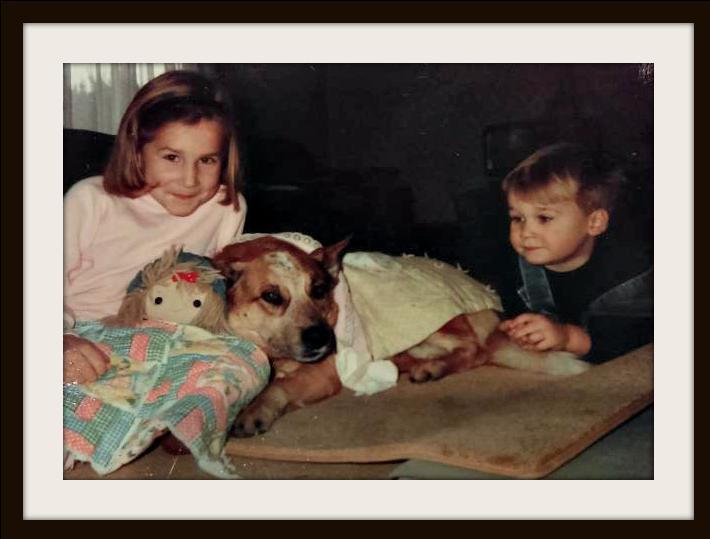
I wanted to help animals and be a veterinarian ever since I was a young girl growing up in rural Northwest Ohio. My childhood dog, Casey, who was only a few months older than me contracted heartworm disease. Seeing him go through treatment and recovery seemed like magic and is one of my earliest memories of how rewarding taking care of animals could be.
Casey was a really wonderful family dog. He was some mixture of cattle dog and German Shepherd who my parents got from the Charolais cattle rancher they worked for near Bozeman, Montana. He was about 45 pounds, loved his family, would climb trees and do acrobatics to catch a Frisbee. In late 1984, when he was about 6 years-old my family noticed that he was coughing and couldn’t tolerate as much exercise. Instead of incessantly asking to have his Frisbee thrown he was content with one catch then lying down under a tree; instead of leading the way out to chicken coop, he trailed behind us. My parents were really concerned and after a visit to our veterinarian’s office they received the diagnosis – heartworm disease.
Heartworm disease is caused by a parasite Dirofilaria immitis and is transmitted between dogs by more than 70 species of mosquitos. Microscopic microfilaria (baby heartworms) are picked up by a mosquito from an infected dog, then after molting into microscopic larva they are then transmitted into another dog with the mosquito biting/taking their next blood meal. These larvae undergo more maturation/molting into immature adults within 2-3 months after infection. These adult heartworms travel throughout the dog’s body, growing and feeding along the way eventually ending up in the heart and reaching 5-7 inches long. Male and female adult heartworms mate, releasing millions of microfilaria into the blood stream. As more and more adults reach the heart their thick cuticles (outer surface) irritate the lining of the heart and major blood vessels causing inflammation/swelling. When the adult heartworm burden is large, they clog up these major blood vessels causing heart failure/caval syndrome – thankfully for Casey (and my family) he was not in heart failure, but would be soon if our veterinarian didn’t start treatment to kill these deadly worms.
I remember my parents sitting my brother Kurt and I down to talk about what was going to happen. Casey was going to get a series of deep muscle injections of an arsenic-type compound (immiticide /melarsomine) that was going to kill the adult heartworm but would make him very sick and he might not make it. He was going to need to rest a lot – no Frisbee, no chasing stray cats from our barns, no climbing trees for multiple months. He was going to need to stay on a leash and be calm. Kurt and I looked at each other and thought that was impossible! Casey was very active and territorial but if that is what needed to be done, we would do our best to help. It was winter and Kurt and I did our best to help Casey feel better after his injections. Casey felt bad for multiple weeks lying by the wood-burning stove, tolerating my favorite yellow doll-blanket on top of him and taking water from a spoon.
Thankfully Casey tolerated the immiticide treatment and follow up test showed it was successful. I really don’t want to date myself, but his was BEFORE monthly heartworm prevention was available. The veterinarian recommended we give Casey a daily flavored preventative – which was very difficult to remember to do. I can remember wanting to be helpful and NEVER have Casey have to go through adult heartworm treatment again. In 1987, a few years after Casey finished his treatment and was almost back to his tree-climbing shape, Heartgard Plus launched and my family only had to remember giving him his prevention monthly – my mom was so relieved!
Most diseases are so much easier to prevent than to treat and heartworm disease in dogs is definitely one of them. Now, every month my two dogs – Ellie Mae and Pacino – hear the foil packaging of Heartgard Plus and coming running to get their prevention in a great beef-flavored chew. I think of Casey and smile. Without the help of our veterinarian making a quick diagnosis, I wouldn’t have had as many treasured memories of dear Casey. And perhaps wouldn’t have had the inspiration to pursue veterinary medicine as a career.
